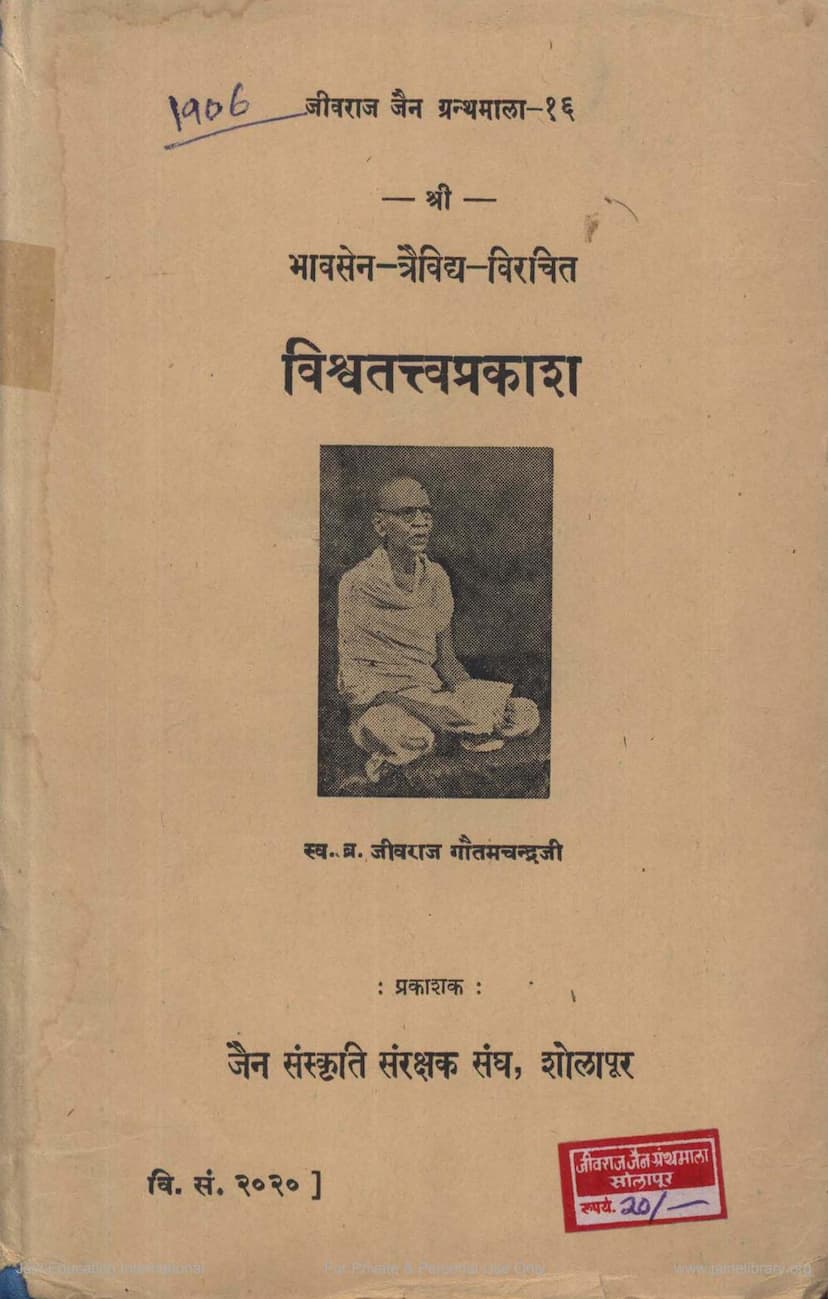Vishwatattvaprakash
Added to library: September 2, 2025

Summary
Here's a comprehensive summary of the Jain text "Viśvatattva-prakāśa" by Bhavsen Traividya, based on the provided catalog link and the text itself:
Title: Viśvatattva-prakāśaḥ (विश्वतत्त्वप्रकाशः)
Author: Bhavsen Traividya (श्री भावसेन त्रैविद्य)
Editor: Vidyadhar Johrapurkar (प्रा. विद्याधर जोहरापूरकर)
Publisher: Jaina Sanskrti Samrakṣaka Sangha, Sholapur (जैन संस्कृति संरक्षक संघ, सोलापूर)
Jīvarāja Jaina Granthamālā Number: 16
Context: The book is part of the Jīvarāja Jaina Granthamālā, established by Brahmachari Jivaraja Gautamchandji Doshi, who dedicated his entire property to the cause of preserving, reviving, and propagating Jain culture and literature. This particular volume is the sixteenth publication in this series.
Author Bhavsen Traividya: Bhavsen Traividya belonged to the Mūlasamgha and Senagaṇa traditions of Jainism. He was renowned as a skilled debater and earned the title "Traividya," signifying his mastery in three branches of classical study: Vyākaraṇa (Grammar), Nyāya (Logic/Philosophy), and Siddhanta (Jain Canonical Teachings). He is estimated to have lived in the latter half of the 13th century AD, possibly flourishing around 1250 AD. His epithet "Vādigirivajra" highlights his prowess in philosophical debates. He is known to have written ten works, seven or eight of which focus on logic and dialectics, and two on grammar.
Viśvatattva-prakāśa: A Treatise on Logical Polemics: The "Viśvatattva-prakāśa" is identified as the first chapter, named "Aśeṣa-paramata-tattvicāra" (अशेषपरमततत्त्वविचार), of a larger work titled "Viśvatattva-prakāśa Mokṣaśāstra." This comprehensive treatise was intended to expound upon the topics and problems related to Mokṣaśāstra, which is synonymous with Umāsvāti's Tattvārtha Sūtra. Whether Bhavsen completed the entire work is unknown, but this first chapter stands as a significant contribution.
Content and Scope of the First Chapter (Aśeṣa-paramata-tattvicāra): This chapter is a critical and polemical review of various philosophical systems, primarily from a Jain perspective. Bhavsen systematically examines and refutes the tenets of:
- Cārvāka System: With respect to the eternal nature of the soul and its distinction from the body.
- Mīmāṁsā School: Particularly regarding the doctrine of Sarvajña (the omniscient).
- Nyāya System: In the context of the theory of creation and the existence of a creator God.
- Vedic Systems: Challenging the concept of Veda as self-evident authority.
- Sāṁkhya System: Critiquing its views on the nature of Puruṣa and Prakṛti.
- Buddhism: Debating its doctrines of Kṣaṇikavāda (momentariness) and the concept of anātman (non-soul).
The main topics of discussion include:
- The eternal nature of the soul and its separate existence from the body.
- The existence of an omniscient being and the authenticity of their teachings (especially relevant to Sarvajña doctrine and the authority of scriptures).
- The existence of a creator God and the theory of creation.
- The eternal nature and authenticity of the Vedas.
- The validity of knowledge (pramāṇa) and the nature of error.
- The theory of monism (advaita) versus pluralism, the nature of Brahman and Māyā.
- The enumeration of substances (padārtha) according to Nyāya and Vaiśeṣika systems.
- The nature of darkness and Śakti.
- The nature of Prakṛti and Puruṣa.
- Buddhist doctrines of momentary existence, the five Skandhas, and the Eightfold Path to salvation.
Methodology and Scholarly Contributions: Bhavsen's approach is analytical and argumentative. He meticulously quotes from numerous Jain and non-Jain works to support his points and to critique opposing philosophies. Prominent Jain works he references include Tattvārtha Sūtra, Aptamīmāṁsā, Samādhitantra, Siddhivinischaya, Syādvādasi d dhi, Parīkṣāmukha, Gommata sāra, and Svarūpasambodhana. His engagement with non-Jain literature is extensive, citing the Rgveda, Upanishads, Sāṁkhyakārikā, Nyāyasūtra, Prasastapādabhāṣya, Ślokavārttika, Brahmasiddhi, Madhyamikakārikā, Vijñaptimātratāsiddhi, Pramāṇavārttika, and Tattvasaṁgraha. He also specifically mentions and criticizes the views of Cārvāka scholars like Purandara, Udbhata, and Aviddhakarṇa.
Editorial Contribution: Dr. V. P. Johrapurkar's critical edition is highly praised for its authenticity. It includes an introduction discussing the author and his works, a detailed essay on "Jaina Tārkika Sāhitya" (Jaina Logical Literature), textual notes (Tippaṇa), and a comprehensive Hindi summary (Sārānuvāda). The introduction itself is a valuable scholarly work, tracing the history of Jaina logic from the Āgama period to the present day and enumerating numerous authors and their contributions, especially addressing chronological issues and bibliographic references.
Historical Significance: Bhavsen's work is valuable for understanding the philosophical landscape of medieval India and the specific points of divergence and convergence between Jainism and other contemporary schools of thought. It helps in critically assessing Jain doctrines in relation to the broader Indian philosophical tradition. The inclusion of the "Jaina Tārkika Sāhitya" essay by the editor, Dr. Johrapurkar, is noted as a significant contribution to the field, potentially serving as a foundational text for revising existing histories of Indian logic.
Manuscripts and Publication: The present edition is based on a paper manuscript from the Karanja Bhandara dated 1615 AD. Variant readings from a manuscript of the Humcha Bhandara, dated 1445 AD, are provided in an appendix. This work marks the first philosophical treatise by Bhavasen to come to light, with hopes for future publications of his other works.
Overall: "Viśvatattva-prakāśa" is a significant work of Jain scholasticism, offering a detailed and critical examination of various philosophical systems through the lens of Jain logic. Its rigorous argumentation, extensive citations, and the scholarly editorial work make it a valuable resource for researchers and students of Indian philosophy and Jainism.